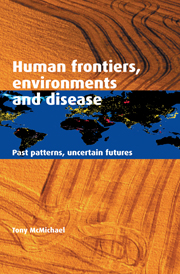‘This impressive book by an eminent public health scientist explores our most important relationship: our interaction with the environment. It is essential reading for all concerned with assuring future human health - and our very survival.'
Robert Beaglehole - University of Auckland
‘This book achieves an unusual and important synthesis of the large-scale evolutionary, social and environmental influences on human health and survival. This ecological perspective, highlighting the history of disease and wellness, the state of our epidemiological environment, and the general impacts of recent cultural trends on well-being, is essential if we are to achieve a sustainable future.’
Paul R. Ehrlich - Stanford University, and author of Human Natures
‘Human Frontiers, Environments and Disease is an innovative and constructive analysis of a problem fundamental to mankind, past, present and future. No one concerned with the bio-medical prospects of the human race could fail to find Professor McMichael’s accomplished account thought-provoking and eye-opening.’
Roy Porter - The Wellcome Institute for the History of Medicine
‘The combination of infection, malnutrition, and population pressure has sapped the vitality of communities for generations. New problems are being added constantly. Industrial development, often without restraining regulations, is causing environmental damage and disease; some of the worst health dangers of the industrialised world, such as cigarette smoking and traffic injury, are becoming increasingly common. McMichael has produced an excellent treatise on these changing patterns of human ecology and disease.’
Source: British Medical Journal
‘As a GP, I found this book very interesting and relevant to my personal medical practice. It was very thought provoking, and stimulated consideration of what the human race has done to affect the evolution of disease processes.’
Source: Doctors.net
‘In his closing sections, McMichael argues that today’s global population cannot sustain current uses of water, air, and soil. Almost half the world’s population lacks proper sanitation, and one in six do not have safe drinking water. At the same time, we produce 12 times more carbon dioxide and have four times more people living on the planet than a century ago, with widening gaps between rich and poor. … Spinoza advised that those who want the future to be different from the past, should study the past, a view heartily endorsed by McMichael in this important work.’
Source: The Lancet
‘McMichael examines one by one the various threats to our welfare and their medical implications … here is a book to make us think differently … a clear, lively, elegantly presented argument of wide scope in which unfamiliar issues are neatly put together. It is a tract for our times.’
Source: The Financial Times
‘The style is relaxed but succinct: I have seldom encountered a text where the essential points about disease causation were given so pleasantly and effectively.’
Source: The British Journal of General Practice
‘McMichael is one of the few public health scientists who have found ways to stand back from sectional interests and study the relationship between individuals, societies and the environment in which we live as a whole … the information is well organized, well illustrated, easy to read and delivered with a welcome sense of humour. It is essential reading for public health scientists, practitioners, academics and students, and for economists of all specialization’s and ideological persuasions, given their increasing influence on public health debates.’
Source: Bulletin of the World Health Organization
‘Outstanding, intelectually stimulating, and with refreshing new ideas … merits a prominent place on the bookshelf of policy-makers, researchers, and teachers alike.’
Source: Global Change & Human Health
‘What I find most interesting and valuable about this book is that it provides one of the best examples I have seen of the global epidemiology approach. It addresses the major global public health issues by considering all of the available epidemiological evidence, some of it stretching back for several millennia … read it for the substantive content, but also read it as an outstanding example of the approach to epidemiology that we will be, or should be, taking in the 21st century.’
Source: International Journal of Epidemiology
‘Professor McMichael tells a wonderful story of humankind. To explain the human condition and our challenges for the future. The book is well organised and well produced. The book deserves to be read by all those with an interest in the human condition. Tony McMichael‘s book represents a major intellectual contribution to public health. Many of his admiring friends and colleagues, myself included, would wish for the ability to have written it themselves.‘
Source: Australian and New Zealand Journal of Public Health
'To attempt to cover the history, geography, biology and evolutionary significance of human health, and provide convincing future scenarios, takes a brave author with an unusual breadth of knowledge. McMichael shows that he is up to the task in this book, which will become a benchmark for discussions of global public health.'
Source: The Times
‘Well written and easily read … a compelling text.’
Source: Pediatric Endocrinology Reviews
'This is a transcendental and grandiose book on a par with H. G. Wells' 'History of the World'.'
Source: Medical Sociology News





